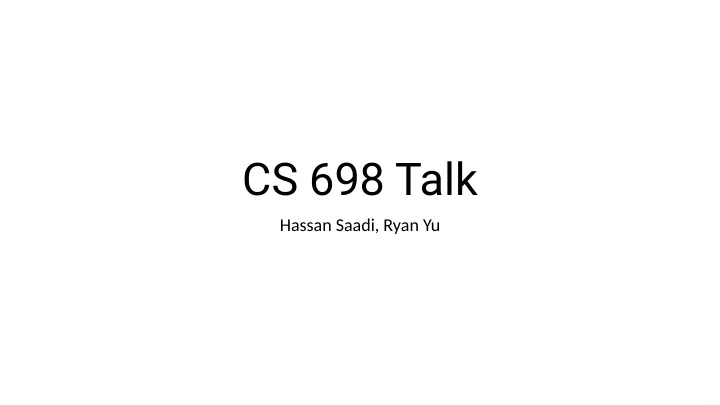

CS 698 Talk Hassan Saadi, Ryan Yu
What we’ve done so far… 1. Found papers to read 2. Read them 3. Did research 4. Wrote our own paper And now: Present our research
What makes an effective presentation? How do you know if your presentation was good?
Context Who are you talking to?
Any talk can be broken into 3 areas: • Intro (20%) – what/why • Main body(60%) - how • Conclusion (20%) – what/why
Motivation • Start with a mathematjcal problem formulatjon vs applicatjons • The source of your idea: Examples from Einstein and Dirac • Show your mistakes: Schrodinger
Einstein’s thought process How Einstein Created Relatjvity out of Physics and Astronomy By David Topper
Dirac’s motivation for inventing Quantum Mechanics The Principles of Quantum Mechanics By Paul Dirac
Schrodinger equation “Where did we get that (equatjon) from? Nowhere. It is not possible to derive it from anything you know. It came out of the mind of Schrödinger.” Richard Feynman
Didactic vs Socratic • Socratjc: You keep asking questjons in order to guide the audience reach the right conclusion. • Didactjc: You present your opinion and let the audience make their own conclusion internally. • Advantages and disadvantages of these two approaches
How to present results (Content) • Don’t put code in your presentatjon! • Don’t put a lot of equatjons unless you are doing theory • Graphs and tables • Dilemma: Should you present your work in very aturactjvely in order to get excellent feedback and funding, or present it well but not hype it in order to get objectjve feedback and fair funding.
Delivery • Eye contact (or fake eye contact) • Slow pace while talking • Replace “uhmmmmms” with silence instead (hard to do) • Time • Nerves • Story
When answering Q&A: • Take a moment afuer a questjon to fully process it. Restate the questjon to the person if you have to.
References: • htups://www.skillsyouneed.com/present/presentatjon-tjps.html • htups://www.entrepreneur.com/artjcle/278153 • htups://www.birmingham.ac.uk/schools/metallurgy- materials/about/cases/tjps-advice/presentatjon.aspx • Images:htups://www.123rf.com/photo_44182686_stock-vector-group-of- young-people-are-sittjng-around-campfjre-and-telling-stories-summer- night-weekend-and-recre.html
Recommend
More recommend